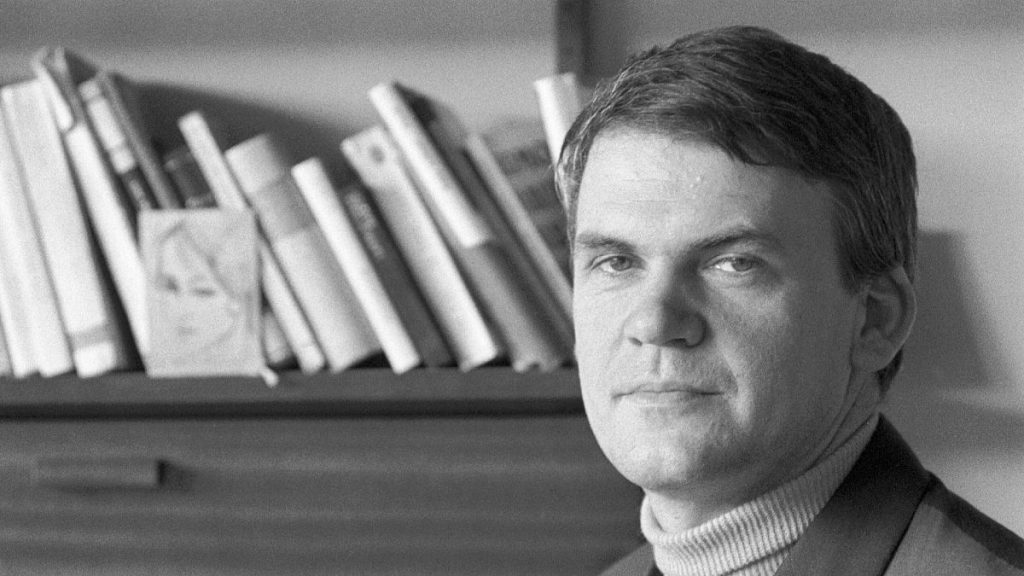Milan Kundera, the celebrated Czech-French writer, and his wife, Věra, have finally returned to his birthplace, Brno, Czechia. Their ashes were recently repatriated and are currently held at the Moravian Library, awaiting the completion of their designated tomb. This marks a symbolic homecoming for Kundera, whose life and literary career were deeply intertwined with the political and social upheavals of the 20th century.
Kundera’s journey began in Brno in 1929, a city that would later become a backdrop for his early works. His initial engagement with the Communist Party ended in two expulsions, prompting his departure to France in 1975. This exile, though initially forced, became a defining aspect of his life. His Czechoslovakian citizenship was revoked in 1979, and he subsequently embraced French nationality in 1981, making France his home for the remainder of his life. Despite this geographical shift, Kundera’s literary work continued to explore themes of identity, memory, and the complexities of life under totalitarian regimes, often drawing upon his Czech experiences. Even after being granted Czech citizenship again in 2019, he never permanently returned, only making occasional visits.
Kundera’s literary output spans several decades, from his debut novel, “The Joke” (1967), a satirical critique of the Czech Communist regime, to his internationally acclaimed masterpiece, “The Unbearable Lightness of Being” (1984). His works, characterized by a unique blend of political commentary, philosophical reflection, and psychological insight, resonated with readers worldwide. He effortlessly wove these complex themes into engaging narratives, establishing himself as a prominent literary figure of his time. His writing transcends mere storytelling, delving into the human condition and the intricate relationship between individual lives and the broader political and social landscape.
The repatriation of Kundera’s and Věra’s remains marks the culmination of a long journey, both literal and metaphorical. After Kundera’s passing in 2023 at the age of 94, Věra kept his urn in their Paris apartment until her own death in September 2024. The fulfillment of Kundera’s wish to be buried in Brno represents a reconciliation with his roots, a symbolic closure to a life marked by displacement and exile. It also underscores the enduring power of his connection to his homeland, despite the complexities of his relationship with it.
The process of bringing Kundera’s and Věra’s ashes back to Brno involved a coordinated effort between French and Czech authorities. Publisher Antoine Gallimard and Czech Ambassador to France Michel Fleischmann played key roles in transferring the urns to Tomas Kubicek, the director of the Moravian Library. The library is currently safeguarding the remains until the completion of their final resting place. Brno City Hall has launched an architectural competition to design the tomb, which is expected to be ready in 2025. This careful and respectful handling of the repatriation process reflects the significance of Kundera’s literary legacy and his enduring ties to Brno.
The return of Kundera’s ashes to Brno carries a profound symbolic weight. It represents not only the physical return of his remains but also a reconnection with his literary origins and the Czech experiences that shaped his writing. His tomb, when completed, will serve as a memorial to his life and work, a place where readers and admirers can pay tribute to his unique contribution to literature. This final act, the return to his birthplace, completes the circle of his life, a life that transcended geographical boundaries and resonated deeply with readers around the world. His legacy, embodied in his insightful and thought-provoking works, continues to inspire and challenge readers, ensuring that his voice and his stories will endure for generations to come. The tomb in Brno will serve as a tangible reminder of his remarkable journey, from the streets of his childhood to the heights of literary acclaim. It will be a place of pilgrimage for those who have been touched by his words and a testament to the enduring power of literature to transcend time and place.














